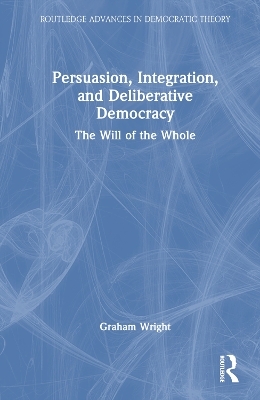
Persuasion, Integration, and Deliberative Democracy
Routledge (Verlag)
978-1-032-52965-3 (ISBN)
It is easy to be in favor of a government that reflects the will of people you like. It is more difficult to be in favor of a government that reflects the will of people you hate. But this is precisely what democracy requires of us. And one of the most serious threats facing democracy today, in the United States and around the world, is the discomfort that many citizens feel toward this core democratic principle: that even those citizens we think of as evil, deluded, or simply wrong should still be allowed a say in what their own government does.
Perhaps the best hope of resolving this tension can be found in the idea of deliberative democracy, which sees a particular form of non-coercive dialogue as an essential component of democratic governance. But in this book, Graham Wright argues that the traditional approach to deliberation through persuasion faces serious challenges that may limit its potential in exactly the situations where the threats to democracy are greatest. Instead, he argues that an alternative method of deliberation based on the process of “integration,” as described by the early 20th-century philosopher Mary Parker Follett, can do a better job of navigating these challenges, and can help us make democratic decisions that better reflect the will of the whole people.
Persuasion, Integration, and Deliberative Democracy: The Will of the Whole is a fresh approach to debates about the challenges of democracy, and the value of democratic deliberation. For anyone wanting to understand the dangers facing deeply divided societies, this is an essential read.
Graham Wright is an Associate Research Professor at the Heller School for Social Policy and Management at Brandeis University and an Associate Research Scientist at the Cohen Center for Modern Jewish Studies, also at Brandeis. Graham is a political scientist, political theorist, and quantitative methodologist. In addition to his work on deliberative democracy and political theory, he has published numerous articles exploring the complex intersection between attitudes and identities in American politics. He has also published articles on survey methodology and contributed statistical analyses to publications in a wide variety of fields, including economics, program evaluation, education policy, sociology of religion, and health policy. His current work focuses on the political and social dynamics of antisemitism among young adults. At the Heller School, he teaches classes on statistics, research design, and contemporary antisemitism.
1. Who are the People?
2. Three Problems with Persuasion: Inclusion, Incentives, and Identity
3. Mary Parker Follett and the Idea of Integration
4. Integration and Persuasion in Practice: Responding to the Problems of Inclusion, Incentives, and Identity
5. Deliberation through Persuasion and Integration in Deeply Divided Societies
6. Integrative Deliberation in a Political System
Epilogue
| Erscheinungsdatum | 25.09.2024 |
|---|---|
| Reihe/Serie | Routledge Advances in Democratic Theory |
| Zusatzinfo | 2 Tables, black and white |
| Verlagsort | London |
| Sprache | englisch |
| Maße | 152 x 229 mm |
| Gewicht | 508 g |
| Themenwelt | Geisteswissenschaften ► Philosophie |
| Sozialwissenschaften ► Politik / Verwaltung ► Politische Systeme | |
| Sozialwissenschaften ► Politik / Verwaltung ► Politische Theorie | |
| ISBN-10 | 1-032-52965-2 / 1032529652 |
| ISBN-13 | 978-1-032-52965-3 / 9781032529653 |
| Zustand | Neuware |
| Haben Sie eine Frage zum Produkt? |
aus dem Bereich


